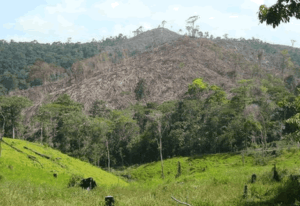Tropical Forest Alliance facilitates collective actions towards afforestation
 The Tropical Forest Alliance (TFA), a platform for public-private cooperation, has expressed the willingness to facilitate a collective approach towards a deforestation-free supply chain in tropical forest countries.
The Tropical Forest Alliance (TFA), a platform for public-private cooperation, has expressed the willingness to facilitate a collective approach towards a deforestation-free supply chain in tropical forest countries.
Addressing participants at a workshop in Accra, Mr Justin Adams, the TFA Global Director, said the Alliance over the years had created a collective space that had brought together stakeholders towards mitigating the problems associated with agriculture and forest commodities.
It has also helped to identify the limits and to find ways to break the barriers towards making progress in the global climate challenge.
He said the TFA exists to actualize the power of the collective and to bring all the stakeholders together towards solving the problems of deforestation in forest commodity producing countries, adding that, forests were critical for biodiversity.
Mr Adams said there had been more work done but in silence, adding that, it was time to break the silence and work for a common purpose of creating a sustainable economic growth and livelihood for all people.
He said there was the need for a collective action by all, with governments making strict regulations to deal with stakeholders, who would not want to act positively towards dealing with deforestation-free supply chain.
He said in 2018 alone, 12 million hectares of forest reserves were lost globally and that if deforestation is not curbed immediately, biodiversity crises could be unsolved because the forest houses 75 per cent of life’s biodiversity.
Mr Adams said unless stakeholders deliberately develop a different approach to forest conservation, there would not be success in the fight against the global climate challenge.
Mr Joseph Lumumba, the TFA Africa Regional Director, said the workshop was significant in developing a new strategy of the TFA to rally all the stakeholders involved in the commodity supply chain towards addressing deforestation in a collective manner.
He said it was the aim of the TFA to assist all stakeholders to arrive at a common understanding of the jurisdictional sustainability approach to make its implementation as practical as possible.
Mr Lumumba said TFA is not an implementer in anyway but had the capacity to facilitate and ensure the effective implementation of collective actions to help identify the location of priority landscapes for afforestation.
He said it was important for government to consider all factors relating to the mining of bauxite in the Atewa Forest, decoupling economic interest from the long-term conservation of such an important biodiversity hotspot.
He said although Government has the prerogative of deciding the fate of mining in the Atewa Forest, it was important to consider not only economic interest but also social, biodiversity, ecosystems uses of that Forest.
Mrs Roselyn Fosuah Adjei, the Acting Director of Climate Change Directorate of the Forestry Commission of Ghana, said the government had developed comprehensive strategies towards mitigating deforestation in the country.
She said government has in place a Draft Cocoa Sector Development Strategy towards improving the productivity of the farmer without the compromising the environment.
She said there is also in existence, the Forest Sector Development Master plan of 2016 that sought to among others, rehabilitate and restore degraded forest reserves as well as enhance the country’s carbon stocks.
Mrs Adjei said, government is also committed to the REDD+ strategy, which is an incentive-based mechanism to reward tropical forest countries for efforts on reducing deforestation and forest degradation in addressing climate change.
She said the REDD+ programme would enhance National and Sub-national institutional coordination for cocoa and forest landscape governance, increase small holder farmer visibility and accessibility to credit facility.
Source: GNA
